Daily Vocabulary Words: Enhance Your Lexicon with Leading Newspapers & Publications
Welcome to the Daily Vocabulary section at Wordpandit!
Our mission is straightforward: to bring you essential vocabulary words featured in top newspapers and publications worldwide. By focusing on words you’ll encounter in renowned sources, we aim to help you enhance your vocabulary effectively and practically.
Our selection includes words from:
– The New York Times
– The Washington Post
– Scientific American
– BBC
– The Guardian
– Psychology Today
– Wall Street Journal
– The Economist
– The Hindu
– The Times of India
– The Economic Times
– Hindustan Times
– Live Mint
– The Indian Express
– And many more.
We are committed to your vocabulary development. Simply visit this section regularly and explore the daily posts. This is your go-to repository for commonly used words, providing significant practical benefits by familiarizing you with vocabulary from the leading publications listed above.
Make it a habit to visit our website daily and expand your lexicon with words from top newspapers and publications.
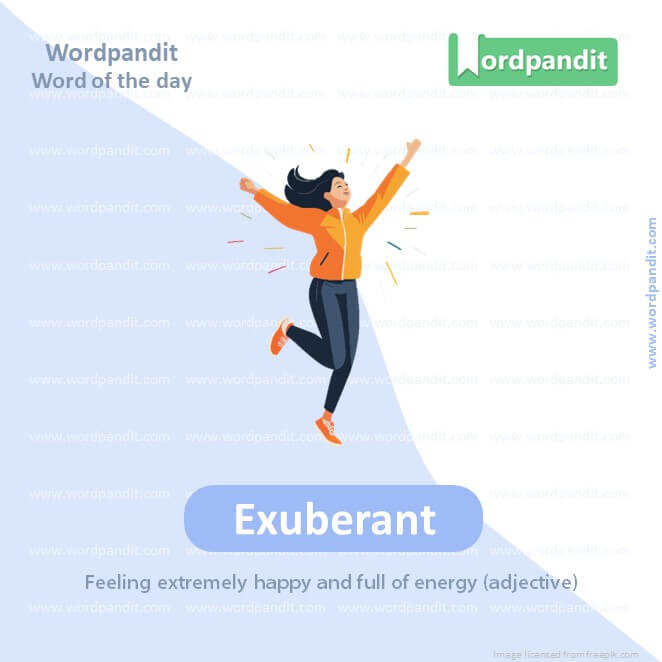
WORD-1: Exuberant
CONTEXT: I did not expect the overflow, exuberant crowds, and I definitely did not expect to see such an immediate and effective pivot from the Biden message of “save democracy” to a Harris campaign that is so plainly emphasizing optimism and hope.
SOURCE: The New York Times
EXPLANATORY PARAGRAPH: Imagine you’re playing with your friends, and you’re so happy and full of energy that you can’t stop jumping and laughing. When someone is super happy and lively like that, we say they are “exuberant.” It’s when you feel so much joy that you just can’t keep it inside!
MEANING: Feeling extremely happy and full of energy (adjective).
PRONUNCIATION: ig-ZOO-buh-rant
SYNONYMS: joyful, energetic, lively, enthusiastic, spirited, bubbly, vibrant
USAGE EXAMPLES:
1. The children were exuberant as they played in the park.
2. Her exuberant personality made everyone smile.
3. He was exuberant after winning the game.
4. The puppy was exuberant, wagging its tail excitedly.
WORD-2: Intuition
CONTEXT: However, the use of AI in music production is not without its challenges and nuances. The human touch in music – the soul, emotion, and creative intuition – remains irreplaceable. AI tools, therefore, function best as collaborators, enhancing and expanding the creative potential of human artists.
SOURCE: The Times of India
EXPLANATORY PARAGRAPH: Intuition is like when you just know something without really thinking about it. It’s like a feeling in your tummy telling you what’s right or wrong.
MEANING: The ability to understand or know something without needing to think about it deeply (noun).
PRONUNCIATION: in-TOO-ish-uhn
SYNONYMS: Instinct, insight, perception, gut feeling, sixth sense, hunch
USAGE EXAMPLES:
1. Her intuition told her that something was wrong.
2. He followed his intuition when making the big decision.
3. Intuition often guides people in making quick choices.
4. The detective relied on his intuition to solve the case.
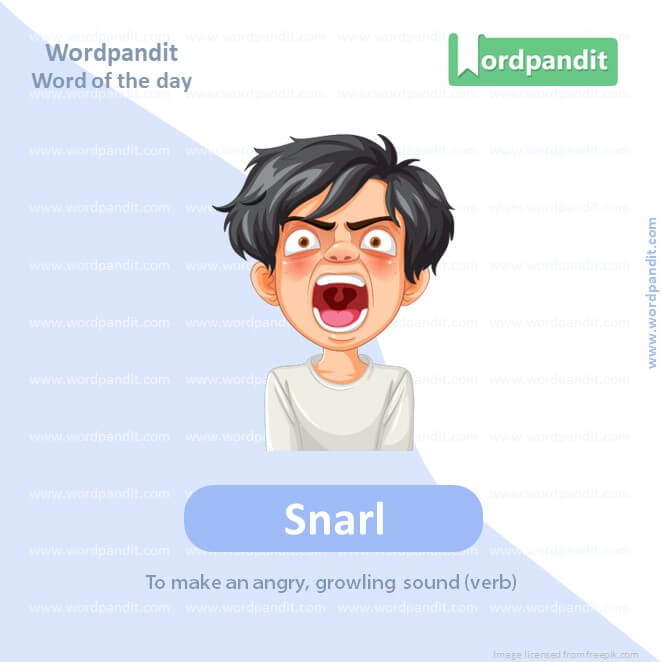
WORD-3: Snarl
CONTEXT: I wonder if we’re on the front end of a change in national temperament that could be fatal for MAGA — if we’re leaving the era of the nasty snarl in favor of the broad smile.
SOURCE: The New York Times
EXPLANATORY PARAGRAPH: When a dog is angry or scared, it might show its teeth and make a low, growly sound. That’s called a “snarl.” But people can “snarl” too, when they talk in a mean, angry way.
MEANINGS: To make an angry, growling sound (verb).
PRONUNCIATION: SNARL
SYNONYMS: growl, bark, tangle, confuse, mess, snap, scowl
USAGE EXAMPLES:
1. The dog snarled at the stranger, showing its teeth.
2. She tried to untangle the snarl of wires behind the TV.
3. He snarled at his friend when he was in a bad mood.
4. Traffic was snarled for hours after the accident.
WORD-4: Exuberance
CONTEXT: I don’t want to make too much of two weeks of Simone Biles’s greatness, Steph Curry’s shotmaking or Katie Ledecky’s dominance, but I felt a spirit of fun and exuberance around the Games that was qualitatively different from what we experienced in Tokyo in 2021 or Rio in 2016.
SOURCE: The New York Times
EXPLANATORY PARAGRAPH: “Exuberance” is like when you’re super excited and full of happiness, so much that you can’t help but run around and laugh. It’s all that happiness and energy inside you coming out!
MEANING: The quality of being full of energy, excitement, and cheerfulness (noun).
PRONUNCIATION: ig-ZOO-buh-runs
SYNONYMS: enthusiasm, liveliness, energy, excitement, cheerfulness, joyfulness, vitality
USAGE EXAMPLES:
1. The children’s exuberance was contagious during the birthday party.
2. His exuberance for life made him popular with everyone.
3. The team’s exuberance after winning was a sight to see.
4. The exuberance in her voice showed how much she loved the surprise.
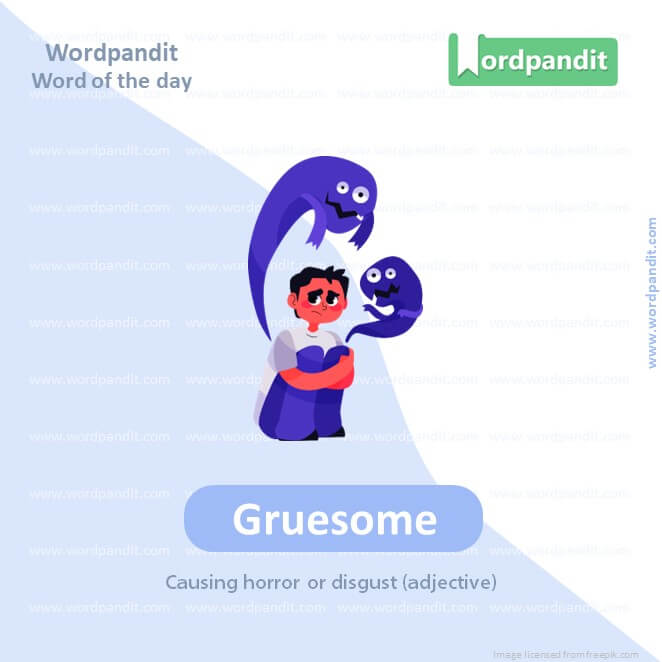
WORD-5: Gruesome
CONTEXT: The circle of life is beautiful and gruesome—sometimes so gruesome that it makes the fossil record downright macabre, millions of years after the fact.
SOURCE: Scientific American
EXPLANATORY PARAGRAPH: When something is really scary, gross, or makes you feel bad, we call it “gruesome.” It’s like seeing a movie with too much blood or hearing a story that makes you cover your ears.
MEANING: Causing horror or disgust (adjective).
PRONUNCIATION: GROO-sum
SYNONYMS: horrifying, disgusting, ghastly, frightful, dreadful, shocking, gory
USAGE EXAMPLES:
1. The horror movie was so gruesome that I had to close my eyes.
2. The detective described the crime scene as gruesome.
3. The gruesome details of the accident were too much to hear.
4. The book had a gruesome story that scared everyone who read it.
WORD-6: Indentations
CONTEXT: One type of bite mark left small, circular indentations on the sea cow bone.
SOURCE: Scientific American
EXPLANATORY PARAGRAPH: An “indentation” is like a little dip or hole in something, like when you press your finger into soft playdough and it leaves a mark. It’s a spot that goes inward, making a small shape or space.
MEANING: A small hollow or dip in a surface (noun).
PRONUNCIATION: in-den-TAY-shuns
SYNONYMS: dent, dip, hollow, notch, recess, groove, depression
USAGE EXAMPLES:
1. The indentations on the cookie dough were made by her fingers.
2. The indentation in the cushion showed where the cat had been sitting.
3. He noticed small indentations on the soft sand after walking.
4. The book had an indentation on the cover from being pressed against something.
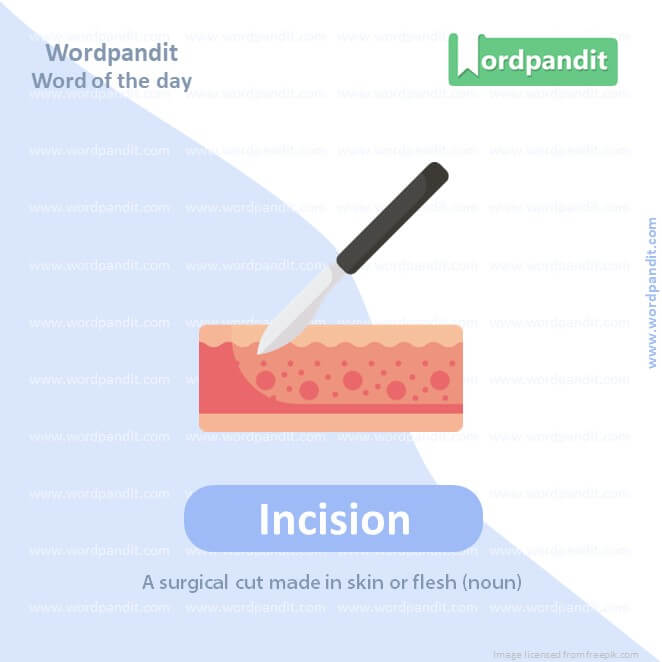
WORD-7: Incision
CONTEXT: Another left deep, round pits with an incision arcing off them.
SOURCE: Scientific American
EXPLANATORY PARAGRAPH: An “incision” is like when you cut into a piece of paper with scissors, but doctors do it on skin during an operation. It’s a careful, straight cut made to help fix something inside.
MEANING: A surgical cut made in skin or flesh (noun).
PRONUNCIATION: in-SIZH-un
SYNONYMS: cut, slit, opening, wound, gash, slice, laceration
USAGE EXAMPLES:
1. The surgeon made a small incision to remove the appendix.
2. The doctor explained that the incision would heal quickly.
3. An incision was made to allow the surgeon to reach the problem area.
4. The patient’s incision was carefully stitched up after the surgery.
WORD-8: Scavenging
CONTEXT: The stray tooth, from an extinct tiger shark called Galeocerdo aduncus, suggests that the slitlike marks were left by the same shark scavenging on the sea cow’s remains, the study’s researchers say.
SOURCE: Scientific American
EXPLANATORY PARAGRAPH: “Scavenging” is like when a bird or animal looks for food, even if it’s just scraps. Sometimes, people do it too, when they search for things they need, especially in trash or leftover places.
MEANING: Searching for and collecting discarded items or food (verb).
PRONUNCIATION: SKA-ven-jing
SYNONYMS: foraging, hunting, searching, rummaging, collecting, gathering, picking
USAGE EXAMPLES:
1. The raccoons were scavenging for food in the trash cans.
2. Some people make a living by scavenging materials from old buildings.
3. Birds were scavenging along the beach for scraps of food.
4. The dog was caught scavenging for food in the kitchen.
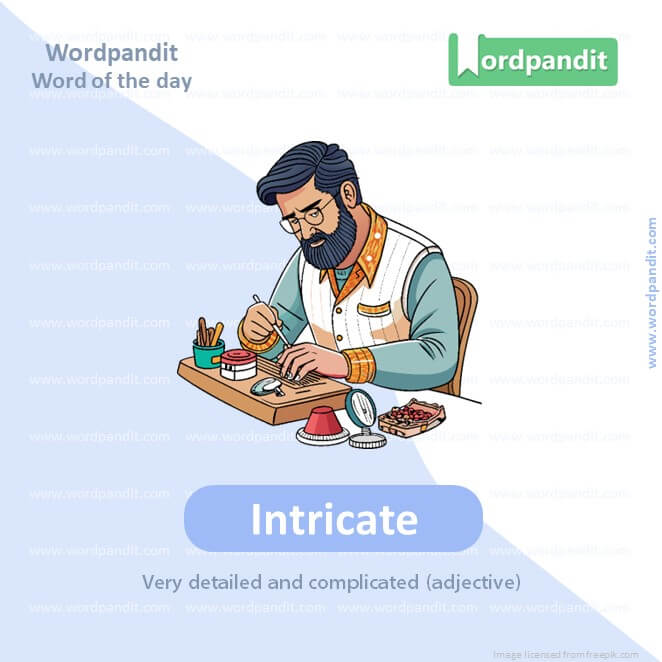
WORD-9: Intricate
CONTEXT: But whatever exactly befell the unlucky creature all those millions of years ago, its fate speaks to the complexity of its ecosystem and is a compelling reminder, all three scientists say, that ancient food webs were just as intricate as modern ones.
SOURCE: Scientific American
EXPLANATORY PARAGRAPH: When something is “intricate,” it means it’s made with lots of little details, like a really fancy puzzle or a beautiful piece of lace. It’s something that takes time and care to make because it’s so detailed.
MEANING: Very detailed and complicated (adjective).
PRONUNCIATION: IN-tri-kit
SYNONYMS: complex, detailed, elaborate, ornate, fancy, complicated, delicate
USAGE EXAMPLES:
1. The artist spent hours on the intricate design of the sculpture.
2. She admired the intricate pattern on the rug.
3. The puzzle was so intricate that it took days to solve.
4. The intricate details of the painting amazed everyone.
WORD-10: Excruciating
CONTEXT: She experienced bursts of excruciating pain in her back and buttocks and running down her legs.
SOURCE: Scientific American
EXPLANATORY PARAGRAPH: “Excruciating” is when something hurts a lot, so much that you can’t stand it. It’s like a super bad pain that makes you want to cry or scream.
MEANING: Intensely painful (adjective).
PRONUNCIATION: ik-SKROO-shee-ay-ting
SYNONYMS: unbearable, agonizing, severe, intense, painful, torturous, piercing
USAGE EXAMPLES:
1. The pain in his leg was excruciating after the fall.
2. She felt excruciating pain when she touched the hot stove.
3. Waiting for the results was an excruciating experience.
4. The excruciating headache made it hard to concentrate.













